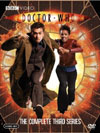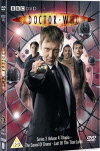DVD Extras (box sets only) include:
First of all is the Earthly setting itself. We've seen too much of Earth in the past three years, and while we've probably had more alien planet settings this year than before, they've all been for the shorter stories. The big stories have blown all chances at taking us across the galaxy as they should. Uggh. Worse is the fact that the program's recent obsession with the British Government continues unchecked until it becomes, essentially, the holy grail. Back in "Aliens of London" (story no. 164), Russell Davies had something poignant to say about world leadership making the exercise worthwhile. Here, it oozes a sense of being overused, and goes far to make the story feel far more small-scale than what this show deserves, particularly for a finale. Thirdly, the manner in which the returning arch-villain of the Master has been written is a disappointing injustice. Having decided to rely on some over-used technology for his powers of mesmerism and mass-hypnosis, our evil mastermind now feels he has little need for any sense of his former charm, charisma, and elegance, and decides instead that he can be as obnoxious, irritating, and ridiculous as he pleases and still get away with it. It goes down with Doctor Who fans about as well as Jar Jar Binks did with Star Wars fans. In other words, don't be surprised to see a hacked fan edit of this story with a line and circle over the Master's face, advertising "70% less idiot" on the front cover.
Who's That Under Your Spell?Poor plot mechanics are also at work to make this far less than believable, by having virtually none of the hypnotized masses get any screen time whatsoever. We see character after character getting irritated and upset at the Master's shenanigans, but not what is compelling them to continue to accept his rule. Where are the shots of the faces of those who are mesmerized by the Master's power?It all points to the absence of a healthy goals vs. barrier structure for the middle act of the plot, to provide challenges which the Doctor and co. should be able to sink their teeth into. After having roped in a large recurring cast, Davies gives them little to do other than get locked in the prisoner dynamic, and most idiotically, keeps the Doctor locked in it with them as well. A good chunk of the screen time is devoted to Martha, producing essentially the third Doctor-less story of the season. Sadly, this is also the least effective one of the bunch. Martha's story strand gets a few interesting beats, particularly when her group embarks upon an action sequence in order to make additional important discoveries. But in the end, Martha's efforts prove to have been an over-complicated way to really just run around looking for the return of the Doctor - a thumbs down motivation for any Doctor-less story. This is such an antithesis of a great story, one shakes one's head wondering what the production team were thinking, or how they can sit and swoon over how great they still think it is on the DVD audio commentary. Having massive logistical complications for a story and figuring out how to pull it all off on time and on budget doesn't necessarily produce a great story. Creating new worlds and alien cultures in which to set the story automatically reduces those logistics by about half, because you no longer need to provide all the present-day Earthly details that the audience should recognize - instead you have the freedom to create situations with logistics that better suit your budget/schedule and enhance your story. Doctor Who needs to be "out there" in the galaxy to become truly epic, and it will be so much easier and more rewarding. In other words, don't be afraid of the quarry as alien planet, or the enclosed set with just a few establishing optical shots. These things can so easily take you out there and give you the freedom to let your characters play and impact each other and leave their mark on a world.
Mythology's QuestIt is important to note that the story is not a complete write-off. The first episode in particular has a number of nice beats as our heroic trio explores the nature and scope of the Master's plans, and comes to grips with who he is. Indeed, John Simm proves he can turn in an excellent performance as the Master when proper scenes are written for him. The Master is in particularly fine form in the middle of the first episode, with his first confrontational words directly with the Doctor being a good highlight.Perhaps best of all is the Doctor's flashback to the Master's origins on Gallifrey, fully fleshed out with audio-visuals including a musical theme for Gallifrey and all the symbolic costumes and regality one remembers from the good old days of this decades-old program. And so we sort of get another alien planet without actually getting our characters there to interact. Most bizarre of all, while the old program was typically good at establishing alien settings with models, but had somehow neglected to ever create a model or any other means of an establishing shot for one of the most often visited and important alien locations in its long history, Doctor Who now presents its first ever view of the domed Capitol building and city on Gallifrey, complete with panoramic view of the majestic surrounding landscape and a poetic voice-over narration from David Tennant - all for a story that doesn't actually go there. Yes, weird. But we'll take excellence wherever we can get it. Thank you! I will also praise the imagination and spiritual nature of the Doctor's glorious table-turning moment leading into the conclusion of this story, which was very beautifully executed on screen. I just don't think it was worth the number of useless scenes that came before it. Similarly to "Doomsday" (story no. 181), Davies is sacrificing good plot stratagems to focus on the discovery of as many ideas, recurring characters, and themes as possible, cramming them into the finale willy-nilly whether or not it makes much sense. U.N.I.T.'s appearance here is once more of the half-hearted variety that we saw in the later Philip Hinchcliffe era. Unless one is prepared to resurrect the great cast charm that we used to get with recurring guest actors like Nicholas Courtney, John Levene, Richard Franklin, and Ian Marter, the exercise of bringing U.N.I.T. back is hardly worthwhile. U.N.I.T. is largely faceless in this story, apart from U.S. President Arthur Winters. His minimal screen time and other more important duties won't begin to fit the bill, although actor Colin Stinton does such a marvellous job of the role that he easily upstages the Master. Well done. And U.N.I.T. has to now compete with Torchwood within this story. John Barrowman seems much more comfortable with himself and his role as Jack Harkness than he did in Season 27, boosting his already considerable charisma up a notch, and making his added presence to the show very welcome. Davies' obsession with the human race proceeds full blast as he focuses on it once again in this story. If we had actually been out to see some of the other civilizations and cultures that Martha wants to refer to in this story, it probably would have worked much better. Instead it's only worthy of a groan in audience response, as we wonder why, yet again, the writers are unable to come up with anything more original.
Parallel ParadoxOne of the most important ideas behind this story's plot rests on very misguided ideas of temporal mechanics, and both the writer and his characters have proven that they ought to know better by now. Luckily, the visuals in the story can support both poor and excellent explanations for what happened, so we can put this plot's bad points down to characters not understanding what actually happens.In short, the better explanation is encapsulated in my favourite line from "Doomsday", which Davies wrote: "Every single decision we make creates a parallel existence, a different dimension...." (Yes, I'll be hanging Davies by this line everytime he commits a sin against it). Too bad this story doesn't have a character who can explain events from this perspective, because it would really elevate the tale. Of course, you know where to find my explanation for events.... in the In-depth Analysis version of this review, along with all the SPOILERS you won't want to know until you've seen the story yourself.
Psychiatrist's Field DayDespite his other character problems, the Master's traditional motivations seem to work fairly well. In some senses he is working to regain what he had before, or rather something that existed before and, though not really his, provided him with some level of comfort.He also has a particularly grand ambition to work towards, rebuilding a new version of society with himself at its head. And it seems he has resolved a previous issue with his lifestyle of choice, practically abandoning all known desire to travel through time and space as a loner, and choosing instead to surround himself with billions of minions in a command structure, and even taking a wife to boot. It almost doesn't seem like him.... and will probably spark more debate amongst fans. And revenge remains a side-consideration as it should, as he continues to enjoy his sparring with the Doctor and finds as many ways as he can think of to draw out that process and get his kicks out of it. It does believably feel like overcompensation for the fear that he showed in his nightmares in "The Mind of Evil" (story no. 56). Extra motivation is added via the new inner expression of his obsessive madness. This seems plausible and okay if it were a recent addition, such as a result of experiences during his latest adventures. I'm not sure I can buy it as something that's been in play since he was eight. Whatever.
"I guess you don't know me so well"The story's wrap-up is quite lengthy. We don't mind, since it seems to contain more substance than the main conflict, and has a few really nice, worthwhile scenes. Captain Jack's portion of the wrap-up is probably the best bit of all. His revelation is thrown away in a nicely ambiguous fashion as well - is he merely pulling the Doctor's leg and keeping a very straight face?
Little did I realize how Davies would surprise me the following year by being excellent precisely where my expectations were lowest.... Season 29 Rankings:
This story has become available on DVD:
Note: The full season sets contain commentaries, behind-the-scenes featurettes, and other extras. The smaller volumes only feature the plain episodes. Comments on this article are welcome. You may contact the author from this page:
|










